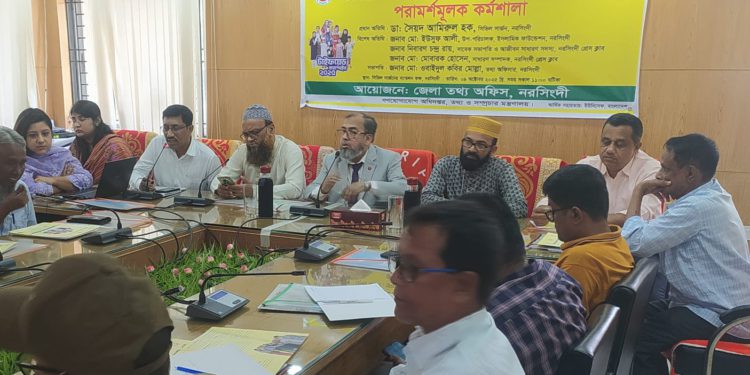Haladhar Das, Narsingdi:: ঐ A day-long ‘Consultative Workshop’ on ‘Typhoid Vaccination’ with the participation of district-level media workers titled ‘Awareness Promotion Program for Children, Adolescents and Women’s Development’ was held at the conference room of Narsingdi Civil Surgeon on Thursday (October 9-2025).
The chief guest at the workshop was Narsingdi Civil Surgeon Dr. Syed Amirul Haque Shamim. The special guests were, respectively, Deputy Director of Narsingdi Islamic Foundation Md. Yusuf Ali, former president and life general member of Narsingdi Press Club Nibaran Chandra Roy, and General Secretary of Narsingdi Press Club Md. Mobarak Hossain. Dr. Trisha Jafri presented the keynote address at the workshop held on behalf of the Department of Mass Communication under the Ministry of Information under the chairmanship of Narsingdi District Information Officer Md. Obaidul Kabir Mollah and moderated by Assistant Information Officer Afsana Akhter. Among others, journalists Fazlul Haque, Manzil A Millat, Hossain Ali, etc.
Speaking as the chief guest, Civil Surgeon Dr. Syed Amirul Haque Shamim said that ‘Typhoid Vaccine’ will play an important role in the physical and mental development of children. Typhoid is a water-borne infectious disease. We all have to be careful of it.
Those who are not aware of getting vaccinated now will have to spend a lot of money to get this vaccine later. While presenting the keynote address, Dr. Trisha Jafri said, Typhoid Fever is a preventable infectious disease. According to the World Health Organization, about 9 million people worldwide are infected with typhoid fever every year, and about 110,000 of them die.
The incidence of typhoid fever is constantly increasing. If this vaccine is not taken, its incidence will increase dramatically.
Typhoid fever is spread through water or food and plays an important role in transmission to others. This bacterium lives only in the human body and can spread in 2 cycles: Short-cycle: Through consumption of contaminated water and food. Long-cycle: The risk of infection can increase through environmental pollution. Typhoid fever usually occurs on average within 7 to 14 days after the germ enters the body, but in some cases it can take from 3 days to 2 months. Densely populated populations, slums or low-income populations are at risk for fever.
Typhoid fever can occur if travelers to epidemic-affected areas lack safe water and healthy sanitation. Symptoms of typhoid fever: Mild fever to persistent high fever (103-104 degrees Fahrenheit), fatigue, headache, chills, loss of appetite, cough, body aches, abdominal pain (may or may not be accompanied by constipation or diarrhea), nausea or vomiting, etc. Dr. Trisha Zafarin urged everyone to be aware of the above-mentioned issues.




















